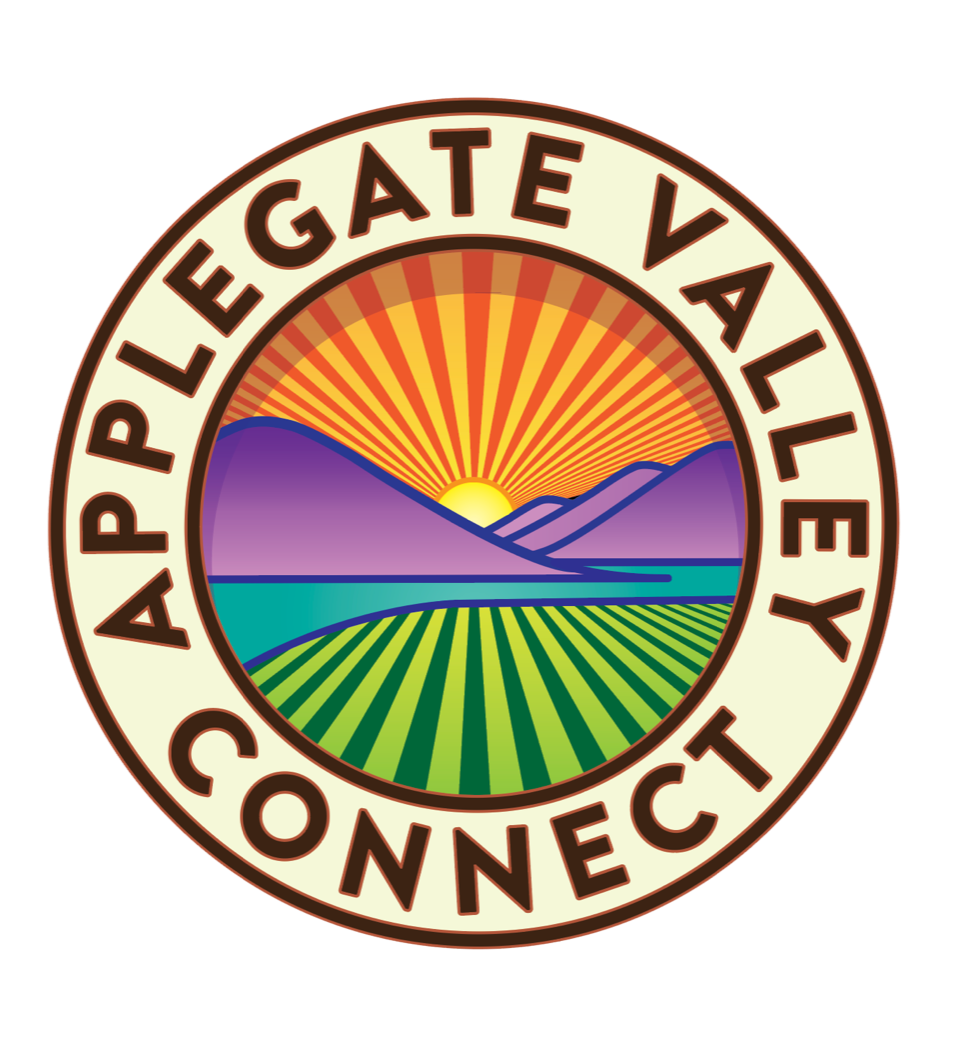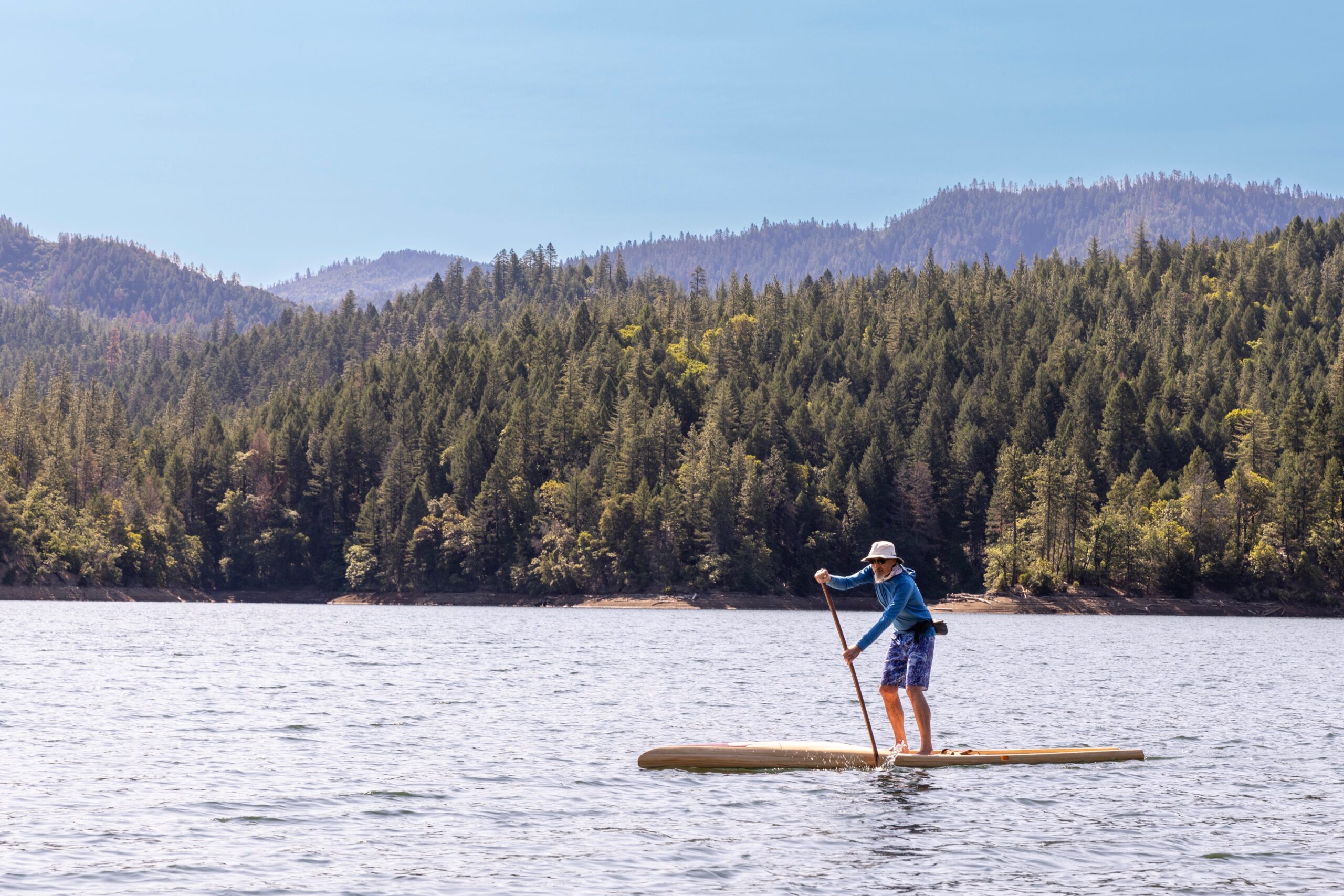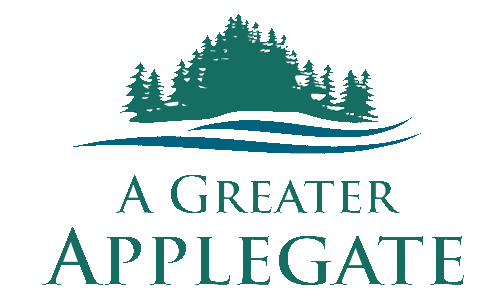Rather than retire, Applegater Randy Bogardus started a business. Clearwood Paddleboards keeps him inspired, fit, and flush in “fun money.”
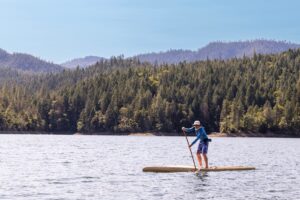
“Standup Paddleboarding is “the single best fitness activity I’ve ever done,” says Randy Bogardus. He can often be found paddling the length of Applegate Lake in the mornings. (photo by Tim Daw).
by Christina Ammon
When Randy Bogardus hit retirement age, he realized his social security check and veteran’s benefits weren’t quite going to cut it. He’d need more income. He could have easily become an Applegate handyman; his background in carpentry and fix-it aptitude would have scored him instant success. But the idea unclogging drains and mending fences didn’t inspire him. If he was going to have to work into his old age, he wanted it be something fun.
So, at age 64 he took a leap and started Clearwood Paddleboards. The Applegate-based business sells build-your-own kits for standup paddleboards (SUP) and surfboards. The kits include the board covering pieces, the fiberglass materials, the fin boxes, assembly manuals, and all the parts needed to assemble a hollow paddleboard or surfboard. You also get attentive tech-support from Randy himself.
I toured Randy’s shop on a day in late spring. Located on his property up Bishop Creek Road, it’s surrounded by lush green grass and immaculately-tended woodlands. When I arrived, wind chimes were creating a restful soundtrack while Randy’s wife (also named Randy!) quietly tended the garden outside their residence. I followed Randy into his palatial shop, noticing his cool, beachy flip-flops and surf shirt. At 76-years old, he moves with the pura vida sprite and ease that comes with a life spent in proximity to water.
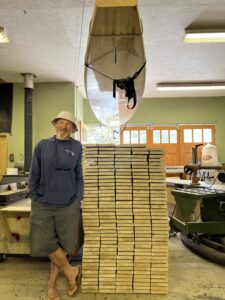
Randy at his Applegate Valley shop.
I looked at the tools that filled his shop: planers, drill presses, and stacks of paulownia lumber—the lightweight wood he prefers for board construction. Although most boards are made of foam these days, wood boards go back hundreds of years when Hawaiians and Polynesians—“the original surfers”— carved native woods to make their boards.
For Randy, using the material represents a coming together of his passions: Carpentry, woodwork, art, and surfing.
“When I started this business in 2010, I launched into a two-year program to set it up,” Randy explained gesturing toward all the equipment. He invested in a cnc router and spent the first several years getting the business up and running.
“I told myself: ‘This WILL work!’”
By all measures, it has. Clearwood Paddleboards now ships product internationally and the business has even opened up rich opportunities—like being flown first class to Majorca, Spain to help someone set up a wood working shop. He’s also been flown on a private jet to Mexico to give surf lessons. During Covid, his business surged; people had lots of spare money and time to build paddleboards. It had him working harder than he wanted, but recent economic uncertainty has slowed things down some. Still, he makes enough to have “walking around money,” some of which he uses to maintain a sailboat in a slip over in Brookings.
A Lifetime Near Water
Randy’s passion for the water started early, when he used to sit with his grandmother near a big picture window at family beach house in Lincoln City, Oregon. Gazing at sea, he would watch tug boats pulling loads of lumber in the distance. “I was always fascinated by these slow-moving craft with their running lights on in the night,” he writes on his website. “[t]here was always something about those images of the far-off ships and tugboats that seemed adventurous, wild and engaging.”
When he was a teenager, he built a wooden sailboat with his dad and brothers and enjoyed using it for years. With his love of watercraft now fully ignited, his course was set. He’d continue on to lead an adventurous lifestyle, building houses and boats, traveling, crewing and surfing. Throughout this journey, he acquired knowledge of sailboats, paddle and surf boards, and life on the sea.
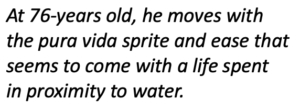 Eventually, decades of surfing took a toll on his body. The overhead arm motion involved in paddling a surfboard wore out his shoulders. That’s when Randy’s interest in Standup Paddleboarding was piqued. Standing up and using the paddle was a way to avoid that overhead motion; instead, he could lock his shoulders in the down position and use core to power the body and board forward. “SUP was a way to stay in the surf-line and not trash my shoulders,”
Eventually, decades of surfing took a toll on his body. The overhead arm motion involved in paddling a surfboard wore out his shoulders. That’s when Randy’s interest in Standup Paddleboarding was piqued. Standing up and using the paddle was a way to avoid that overhead motion; instead, he could lock his shoulders in the down position and use core to power the body and board forward. “SUP was a way to stay in the surf-line and not trash my shoulders,”
Soon he was a regular at Applegate Lake, paddling the length of it every day. He started to get fit enough to enter races—and win. Randy laughs: “People would say ‘Oh, here comes grandpa on his wood board!’” But jokes aside, Randy praises SUP as “the single best fitness activity I’ve ever done.”
Life in the Applegate
Given his love of the sea, one wonders why Randy doesn’t live full time at the coast. But he’s content in the Applegate Valley. His wife has lifelong roots here plus, they are bonded to their property. They bought it 24 years ago and spent the first seven salvaging the house. In those early years, they lived out of a utility room and a travel trailer. Randy recalls washing their dinner dishes in the bathtub, but the hassles were worth it.
“There is just an ambiance to the Applegate that not too many parts of Jackson County have,” he explains. “Plus, it’s close to the lake and close enough to town.” He also found it close enough to Crescent City to get his surfing fix. Even when he was starting Clearwood Paddleboards, he’d often do day-trips to the coast, come home and work till 2 a.m. and do it all over again the next day.
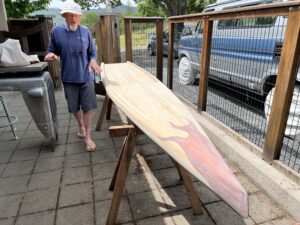
Randy made part of this board out of redwood salvaged from “Tunnel 13”— an old tunnel at the top of the Siskiyous. The tunnel was where the last train robbery in North America occurred.
We finished our tour by looking at some of the completed boards that he has around the property, each of which typically takes 200-300 hours to complete—sometimes more. One was made partially out of redwood salvaged from “Tunnel 13”— an old tunnel at the top of the Siskiyous where the last train robbery in North America occurred. The tunnels back then were shored with old growth redwood from Humboldt County. By the mid-80s, the government abandoned those railways and took all the old shoring out. Randy got his hands on some.
Looking back on the last decade, Randy credits the Internet for some of his success. “Any place Fed Ex and USPS goes, I can go. Without the Internet, I wouldn’t have been able to do this,” he explains.
Of course, his persistence counts for something, too. And passion. “It really does change the nature of work when you just can’t wait to get up and get started,” he says.
And, last bit not least, a pinch of financial strain. “People say Necessity is the mother of invention,” he laughs. “I say Desperation is the mother of invention!
Randy often thought of a Steve Jobs quote while he was beginning the business: “A lot of people have a lot of great ideas but they quit too soon.” As Randy sunk thousands of dollars and hours into his Clearwood Paddleboards venture, he kept that sentiment in his mind everyday.
“I just kept telling myself: This HAS to work!”
Thoughts to share? We’d love to hear from you directly! Please email: [email protected]
